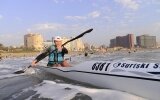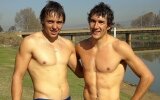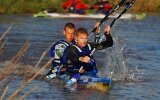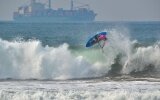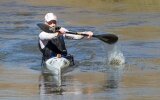- Magazine
- #readityourway
- Weekly Stories
- #shareyourstory
-
Adventure
- Abroad Travelling
- Africa Travelling
- Events
- Expos & Shows
- Festivals
- Fishing
- Free Diving
- Gliding
- Horse Riding
- Inspiring People
- Islands Travelling
- Kite/Windsurfing
- Motorbiking
- Motorised Water Sports
- Mountaineering
- Mountain Biking
- Off-road 4x4
- Off-road Motorbiking
- Paddling
- Performance Driving
- Photography
- Rock Climbing
- Rollerblading
- Sailing
- Scuba Diving
- Skateboarding
- Skydiving
- Snowboarding & Skiing
- Surfing
- Swimming
- Trail Running
- Wakeboarding
- Waveski Surfing
-
Sport
- Adventure Racing
- Fishing
- Free Diving
- Gliding
- Health & Fitness
- Horse Riding
- Inspiring People
- Kite/Windsurfing
- MMA
- Motorbiking
- Mountain Biking
- Multi-sport
- Off-road 4x4
- Off-road Motorbiking
- Paddling
- Performance Driving
- Photography
- Road Cycling
- Road Running
- Rock Climbing
- Rollerblading
- Sailing
- Scuba Diving
- Skateboarding
- Skydiving
- Snowboarding & Skiing
- Surfing
- Swimming
- Rugby
- Trail Running
- Triathlon
- Wakeboarding
- Waveski Surfing
- Lifestyle
- Calendar
Paddling the Peninsula
Words: Kevin Winter ǀ Photos : Various photograhers
Category:
Paddling
The Peninsula Paddle is an annual Cape Town event, held to coincide with World Environment Day (5 June) celebrations each year. The event raises awareness about major social and environmental concerns that affect the Cape Peninsula’s inland waterways, ultimately aiming to change the way urban waterways are managed.
The first paddle took place in 2010 with four social and environmental activists, Thomas Cousins, Trevor Johnston, Alistair Lee, and Kevin Winter, exploring the potential to navigate from one side of the Peninsula to the other via the waterways. They had no idea at the time that their adventure would raise such interest in these waterways. It took these four paddlers 11 hours to complete the journey, covering a relatively short distance of 27 km. Most of the rivers and canals were filthy; parts were filled with solid waste and covered in submerged and floating weeds. More portaging than paddling. Many sections were impossible to paddle, but since then there has been substantial improvements.
Conditions for the paddle this year on Sunday, 9 June were ideal. Good rains during the week before ensured that the waterways were refreshed and raised the water levels. Warm temperatures and windless conditions on a balmy winter’s day in Cape Town made the paddle the best ever. More than 60 paddlers set off at sunrise from Muizenburg Beach in canoes, kayaks, and on Stand Up Paddle (SUP) boards. They navigated their way through an intricate network of inland waterways, heading for Woodstock Beach on the other side where they travelled out to sea along the shoreline before entering the Diep River at Milnerton Lagoon. The gruelling day finished at Woodbridge Island, Milnerton.
Not everyone made the entire journey through, but, as has become custom, paddlers are free to join the event at various stages depending on the type of craft and their physical fitness. This year, Riaan Manser, adventurer extraordinaire, joined the paddle from start to finish. He is a huge inspiration and this ‘nice guy’ thoroughly enjoyed the camaraderie and social chats with fellow paddlers along the way. Riaan has ridden his bike around Africa, paddled around Madagascar and Iceland, and now the Peninsula Paddle! Is there anything left for him to do?
The paddle passes through many neighbourhoods of the city and each year highlights the urgent need to deal with the social and environmental conditions in and around Cape Town’s inland waterways.There is a simple message at stake: everyone in the city is connected to the waterways and the quality of these waterways is influenced by what happens on land. These waterways travel through the city, crossing historical and political divisions, as well as through rich and poor areas. Paddlers cannot fail to notice these differences. These are massive challenges, but what can be done about it? One obvious opportunity is to start by improving sections of the waterways that can bring people together, for example, Princess Vlei, Sybrand Park, and parts of the Black River. The concept is simple: make space for people to enjoy and value these waterways, improve the conditions, and encourage people, aquatic species, and birdlife to return to neglected areas.
The paddlers enjoyed much cleaner, safer waterways this year thanks largely to the City of Cape Town’s Kader Asmal Project, an initiative that was started by the Mayor in 2011. It is a public works programme that currently employs over 200 previously unemployed people to clean, plant, and rehabilitate 18 rivers across the city. The difference is noticeable. The Black River, for example, once choked with weeds in 2010, is now one of the most spectacular sections of the Peninsula Paddle. From here, paddlers go all the way out to sea, through the waves at Woodstock Beach and into Table Bay. On a peach of day, with Table Mountain as the backdrop, it is one of the best scenes the world can offer.
A number of related activities on the day are undertaken at key points en route to develop this concept further. One such activity is the newly named 'Paddle for Peace' event held at Princess Vlei, which focused on environmental education for youths. Six organisations, AfriOceans, ARESTA, Gravity Adventures, Princess Vlei Forum, Waste Wise, and WESSA co-ordinated activities at the vlei for 50 youths (aged from 11 to 14) from the local neighbourhood. These activities including paddling on the vlei, water testing, education about peaceful advocacy for water awareness, raising awareness about the plight of Princess Vlei itself, tree pledges, and litter audits.
The Peninsula Paddle is getting message across and a fifth paddle is planned for June next year. Will you join us?
dinFO:
For further information about the Peninsula Paddle visit the website: pennisulapaddle.wordpress.com
Related content
|
Aussie Morfitt Organising Hansa Fish Challenge
|
|
|
|
|
|
|
|
|

